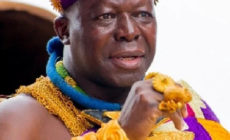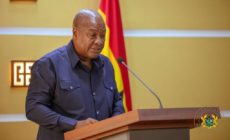Prez. Mahama’s power to pardon Montie 3 challenged
- Posted on
- Comment
 President John Mahama’s power to pardon three convicted contemnors has been challenged by a private legal practitioner Nana Asante Bediatuo.
President John Mahama’s power to pardon three convicted contemnors has been challenged by a private legal practitioner Nana Asante Bediatuo.
The lawyer affiliated to the New Patriotic Party believes the president may be acting ultra vires (beyond his authority) if he were to grant the wish of dozens of NDC supporters petitioning and campaigning for three Montie FM contemnors to be pardoned by the president.
The three, Salifu Maase, Alistair Nelson and Godwin Ako-Gunn were yesterday handed a four month jail term for contemptuous comments they made against the Supreme Court and for threatening to kill the judges who sat on a case brought against the Electoral Commission.
Supporters of the governing National Democratic Congress have heavily criticised the judgment and have decided to use other means to get the convicted persons out of jail.
The aggrieved supporters have mounted a campaign for the president to activate his executive power under Article 72 to pardon the convicted persons.
They are signing a petition to mount pressure on the president to grant their wish.
But lawyer Nana Asante Bediatuo believes NDC supporters may be leading the president into an abyss if he were to grant their wish.
Whilst acknowledging that Article 72 grants the president the power to pardon convicted persons, he was quick to add that the constitution makes a thorough distinction between criminal offences and criminal contempt.
He added the president has the power to pardon people convicted for criminal offences but does not have same to pardon convicts for criminal contempt.
He quoted Articles 19 (11), 19 (21), 14 (1a) all of which draws a distinction between criminal contempt and criminal offences.
He said if the two were the same or had the same effect, the framers of the constitution will not painstakingly attempt to draw a distinction between them.
Nana Asante Bediatuo said even if the president had the power to pardon the convicts (something he doubts) Article 296 (2) states that that discretion must not be exercised arbitrarily.
“There are procedures on how the president can exercise his power of mercy,” he stated, adding the president must act on the advice of the Council of State and must not be seen to be bias or prejudicial.
He quoted the constitution as saying, where a person, other than a judge seeks to exercise a discretionary power, as the supporters are asking the president to do, he must first send to Parliament a Constitutional Instrument for approval before he will be able to exercise that authority.
The president does not have a carte blanche to grant a pardon, he pointed out.
But another lawyer Kwabena Fio disagrees with Nana Asante Bediatuo. He argued the president can still pardon the three contemnors despite the distinction between criminal contempt and criminal offences.
He said there is an object behind power of the president to grant pardon and that power can exercised in the Montie case.
-myjoyonline










 (Selorm) |
(Selorm) |  (Nana Kwesi)
(Nana Kwesi)